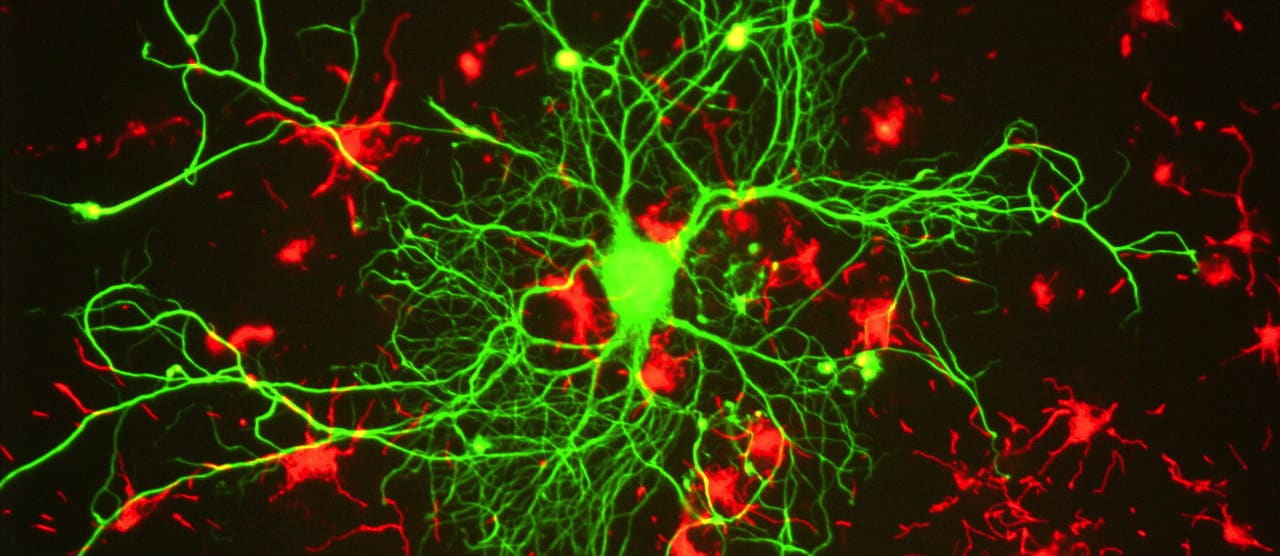The distinguished neurologist Roy Swank‘s low saturated fat diet remains the “most effective treatment of multiple sclerosis ever reported in the peer review literature.” In patients with early stage MS, 95% were without progression of their disease 34 years after adopting his meat and dairy-restricted diet. Even patients with initially advanced disease showed significant benefit. To date, no medication or invasive procedure has ever come close to demonstrating such success.
To understand one reason why a plant-based diet may be so successful in treating the disabling auto-immune disease, one has to first understand how the immune system works. This was one of the greatest mysteries in all of biology—solved by a brilliant scientist who won the Nobel in 1960 for figuring it out.
As I illustrate in my 3-min. video Clonal Selection Theory of Immunity, each one of our antibody-producing immune cells, called B-cells, produces only one type of antibody. Antibodies are one of the main weapons our immune system uses to attack foreign invaders. And they’re specific. It’s not just like we have one B-cell that covers grass pollen and another that covers bacteria, we have a B-cell in our body whose only job is to make antibodies against the pollen of purple Siberian oniongrass! (whether or not we ever come in contact with it). Another whose only job is to make antibodies against the tail proteins of bacteria that live only in the thermal vents at the bottom of the ocean…
Wait a second. There must be a billion different things in the world. If each of our B cells produces only one type of antibody, then we’d need to have a billion different types of B cells. And we do!
So, let’s suppose one day you’re walking along and get attacked by a platypus (they have poison spurs on their heels you know). And so for your whole life up until that point the B-cell in your body that produces antibodies against duck-billed platypus venom was just hanging around, twiddling its thumbs, until that very moment. As soon as the venom is detected that specific B-cell starts dividing like crazy, making copies of itself, and soon you have a whole swarm of clones specialized for platypus poison protection. Fending off the toxin, you live happily ever after. That is how the immune system works. Aren’t our bodies spectacular?
If we have a billion different types of antibody-producing B cells, each capable of recognizing a different molecular signature, why then do we tend not to attack ourselves? And how can what we eat sometimes undermine this inherent protection from autoimmune disease?
As I describe in my 3-min video Clonal Deletion Theory of Immunity, the reason that we don’t often fall prey to friendly fire is because before we’re even born we kill off each and every B cell that recognizes us. That’s what our thymus gland is for. When we’re still a fetus, our body lines up all our immune cells, holds up a picture of our self and asks them one by one: “do you recognize this person?” And if any of our immune cells says yes, they’re killed on the spot, death by apopotosis (programmed cell death) and good riddance.
Turns out this process of ridding our bodies of self-recognizing immune cells happens throughout our lives, mostly in our bone marrow. If you remember, though, in my video series on IGF-1 (starting with The Answer to the Pritikin Puzzle) animal protein consumption increases the level of a cancer-promoting growth hormone that prevents apoptosis, prevents our body’s killing of cells it wants to get rid—that’s why IGF-1 levels are linked to cancer. So IGF-1 might contribute to the inappropriate survival of self-reactive white blood cells in autoimmune or inflammatory conditions. Maybe that’s why people who eat plant-based diets appear protected from autoimmune diseases, explaining, for example, the extraordinary rarity of most autoimmune diseases among sub-Saharan rural blacks following a traditional plant-based diet. Before they changed their diets, evidently not a single case of MS had been diagnosed among a population of 15 million.
–Michael Greger, M.D.
PS: If you haven’t yet, you can subscribe to my videos for free by clicking here and watch my full 2012 – 2015 presentations Uprooting the Leading Causes of Death, More than an Apple a Day, From Table to Able, and Food as Medicine.
